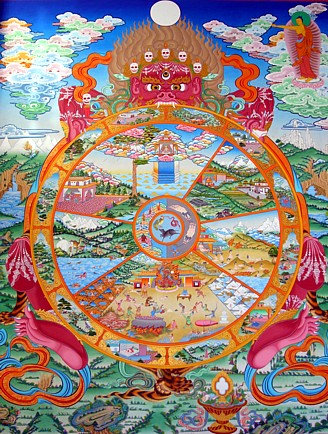Samsara: Difference between revisions
Jump to navigation
Jump to search
No edit summary |
mNo edit summary |
||
| (2 intermediate revisions by the same user not shown) | |||
| Line 1: | Line 1: | ||
[[Image:Wheel of life.jpg|frame|[[Wheel of Life]] | [[Image:Wheel of life.jpg|frame|[[Wheel of Life]]]] | ||
'''Samsara''' (Skt. ''saṃsāra''; Tib. [[འཁོར་བ་]], ''khorwa'', [[Wyl.]] ''‘khor ba'') is the cycle of conditioned existence, birth and death, which is characterized by [[suffering]] and in which one is continually reborn until attaining [[nirvana]]. | |||
==Translation== | ==Translation== | ||
| Line 16: | Line 17: | ||
*[[Six classes of beings]] | *[[Six classes of beings]] | ||
*[[Three realms]] | *[[Three realms]] | ||
[[Category:Key Terms]] | [[Category:Key Terms]] | ||
[[Category:Sanskrit Terms]] | |||
[[Category:Three Realms of Samsara]] | |||
Latest revision as of 18:52, 30 August 2017

Samsara (Skt. saṃsāra; Tib. འཁོར་བ་, khorwa, Wyl. ‘khor ba) is the cycle of conditioned existence, birth and death, which is characterized by suffering and in which one is continually reborn until attaining nirvana.
Translation
Luis Gomez has written:
- ...one should note that saṃsāra is not "cyclic" existence. The term means either wandering about or moving on without interruption, like a river current.[1]
Alternative Translations
- The round (Matthew Kapstein)
Notes
- ↑ Luis O. Gómez, 'The Way of the Translators: Three Recent Translations of Sântideva's Bodhicaryâvatâra'. Buddhist Literature I (1999) p.314.